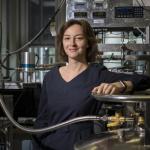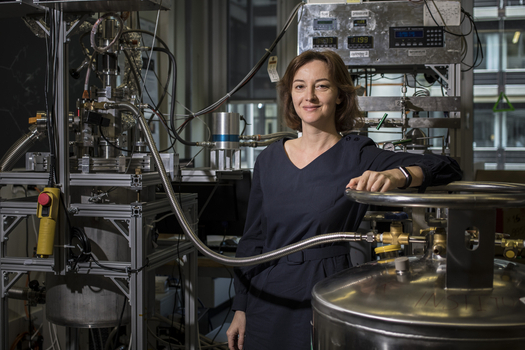Laura Baudis: “I am involved in designing deep underground experiments” | A day in the life blog

May 27, 2019 by Bruno Martin
“I am involved in designing deep underground experiments”
Blog: A day in the life of a physicist
Meet Laura Baudis, German researcher and Elusives PI at the University of Zurich

What is your field of study?
My research field is experimental astroparticle physics. I am interested in finding out about the composition of dark matter in our Universe, and to reveal the nature of neutrinos — whether they are their own antiparticles or not. I am thus involved in designing, constructing and operating ultra-low background, deep underground experiments, such as XENON and GERDA, which aim to discover dark matter particles and neutrinoless double beta decay, respectively. The latter is an extremely rare nuclear decay process which can only happen if neutrinos are their own antiparticles. I am leading the effort to build the future DARWIN observatory in astroparticle physics, a detector which will operate 50 metric tonnes of liquid xenon in a time projection chamber.
What does the Elusives project provide for early stage researchers?
The network is a wonderful opportunity for young physicists to work within an international group, to spend valuable time in other research groups and in the industry, to get involved in exciting outreach activities and to start common research projects with other early stage researchers.
Why did you start your career in science?
As a young person I was fascinated by math, but also by literature, philosophy and architecture. In high school, I was mostly interested in math, philosophy and computer science. In the late 80s we explored all kinds of programming languages, including assembler language and we were excited to write code for our school “supercomputer” — back then it occupied an entire room.
However, in the last year of high school I became interested in quantum mechanics, so I decided to study physics and astronomy at the University of Heidelberg. As a student, I was fascinated by astroparticle physics and cosmology. In the mid-nineties, astroparticle physics was a relatively young field and the existence of dark matter, for instance, wasn’t established as strongly as it is today. Embarking on a search for dark matter particles seemed a formidable challenge at the time.
A typical day:
Morning
I get up early in the morning, drink a coffee and check emails, I answer urgent messages and take care of tasks that need my immediate attention; I also make a plan for the day. Around 8:15 - 8:30am I walk or cycle to work, where I prepare my lectures or teach, or meet with my group, depending on the day of the week.
Lunch
Most days I skip lunch, but sometimes I go to the cafeteria and grab a sandwich or a salad. I try to read a paper or just browse the arXiv.
Afternoon
I participate in XENON, GERDA, LEGEND or DARWIN meetings (some of which I must organise), sometimes in committee meetings at the department, or at our faculty. If I do not have a meeting, I try to focus on research (writing a paper, talking to students, postdocs and the technician in my group, go to the lab — sadly I have no time to actually work in the lab, unless I’m on sabbatical). I review manuscripts, proposals, theses of group members (bachelor, master, or PhD theses). A significant amount of time is spent writing proposals, or reports.
Evening
I try to spend the evenings with my family, and most days I work from home after dinner. For example, I take care of issues related to the journal (EPJ-C) where I am one of the editors-in-chief. I also try to read a book late in the evening, even if only a few pages per day, that is not directly connected to my work.


